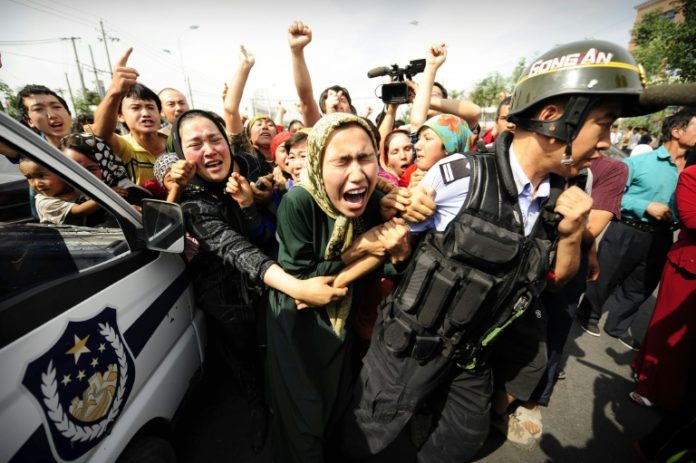The plight of the Uighur Muslim community in China has been haunting the fringes of the news in recent weeks, but what exactly is happening to this minority ethnic group?
One of China’s 55 ethnic minorities, Uighurs are Turkic in origin, with cultural affiliations to Central and Eastern Asia.
Although Uighurs are recognised as being native to just one global region, the Xianjiang Uyghur Autonomous Region of the People’s Republic of China, the Chinese government refuses to categorise Uighurs as an indigenous population, insisting on their identification as a regional minority.

It is believed that more than a million, or one in ten, Uighur people have been interned in Chinese detention camps, although the Chinese government has consistently denied these reports, insisting that the Xinjiang camps conduct voluntary education and training and combat Islamic extremism.
According to the New York Times, the governmental crackdown was sparked in 2014, following an attack carried out by Uighur militants at a train station in Xinjiang, in which over 150 people were stabbed and 31 people sustained fatal injuries.
In the wake of the attack, the Chinese president Xi Jinping delivered a number of speeches to officials during and after a visit to Xinjiang, in which he demanded a comprehensive ‘struggle against terrorism, infiltration and separatism’ using the ‘organs of dictatorship’ and showing ‘absolutely no mercy’.

The ‘re-education’ campaign in Xinjiang was intensified in the wake of the appointment of a new ardent leader in the region, Chen Quanguo, who invoked Xi Jinping’s previous exhortations and instructed local officials to ’round up everyone who should be rounded up’.
Classified documents leaked by a leading official within the Chinese Communist Party to the International Consortium of Investigative Journalism in recent days reveal that inmates in the Xinjiang camps are not allowed to leave the detention centres unless they undergo ‘ideological transformation’.
Labelled ‘The China Cables’, the leaked documents include a nine-page memo distributed to those who run the camps two years ago by then deputy-secretary of Xinjiang’s Communist Party and the region’s leading security official Zhu Hailun.

According to the BBC, this memo details instructions to camp managers to run the centres like high-security prisons, enforcing strict discipline and ensuring that detainees do not escape. The memo orders officials to ‘never allow escapes’; to ‘increase discipline and punishment of behavioural violations’; to ‘promote repentance and confession’; to ‘make remedial Mandarin studies the top priority’; to ‘encourage students to truly transform’; and to ‘ensure full video surveillance coverage of dormitories and classrooms free of blind spots’.
The leaked documents demonstrate the rigidly regimented lives of the prisoners: ‘The students should have a fixed bed position, fixed queue position, fixed classroom seat, and fixed station skills during work, and it is strictly forbidden for this to be changed.’
Officials were also instructed to ‘implement behavioural norms and discipline requirements for getting up, roll call, washing, going to the toilet, organising and housekeeping, eating, studying, sleeping, closing the door and so forth’.

Amid rumours of indoctrination and forced labour, the memo reportedly outlines a points-based punishment and reward system enforced to promote ‘ideological transformation’, with a detainee’s points influencing their permission to contact family members and the duration of their imprisonment.
In addition, the leaked documents show that the Chinese government has been using mass surveillance and a predictive-policing software that analyses personal data to flag members of the Uighur community for investigation and possible detention. The documents also explicitly instruct officials to target Uighur people with foreign citizenship and to keep an eye on Uighur people living outside of China.
Human rights organisation Amnesty International has condemned the use of detention camps in the Xinjiang region, and has called for international pressure to be put on the Chinese government to end internment.

Responding to the leaked China Cables documents, Amnesty International’s Campaigns Director for East Asia Lisa Tassi said: ‘China’s continued denial of the existence of detention centres in Xinjiang grows ever more futile in the face of ever-mounting evidence. This latest leak is yet further proof of its systematic persecution of ethnic and religious minorities in China on a sickeningly vast scale.’
Ms. Tassi added: ‘The abuses described in these leaked documents match the harrowing testimony Amnesty International has received from former detainees of mass internment camps in Xinjiang, as well as from relatives of those still missing.
‘With each passing week, the world learns more about the horror China is unleashing on its own citizens in Xinjiang. It is time for the Chinese government to ditch its feeble counter-narrative, including the claim of providing “vocational training” to people in the camps. Instead they should provide immediate answers to the hundreds of thousands of people desperate for information about their loved ones.

‘If China has nothing to hide, it should allow truly independent human rights monitors immediate and unfettered access to Xinjiang — something it has steadfastly refused to do so far, despite repeated requests from Amnesty International and others.
‘These damning leaks should be the catalyst for the international community to increase pressure on the Chinese authorities to end this human rights catastrophe.’
Responding to reports surrounding the China Cables, a spokesperson for the Chinese Embassy in Ireland told Extra.ie that media reports on ‘the so-called “China Cables documents”‘ made use of ‘clumsy patchwork and distortion to smear China’s efforts in counter-terrorism and de-radicalisation of Xinjiang.’

The spokesperson added: ‘The issue Xinjiang faces is not about ethnicity, religion or human rights. Rather, it is about fighting violence, terrorism and separatism. Since 2015, China has released seven white papers on Xinjiang’s counter-terrorism and de-radicalisation efforts as well as vocational education and training work, which are clear and thorough statements of what happens in Xinjiang.
‘From 1990s to 2016, thousands of violent and terrorist incidents occurred in Xinjiang, which caused heavy casualties and property losses. Faced with such severe circumstances, Xinjiang lawfully fought those crimes while addressing the root causes and making utmost efforts to protect residents’ basic human rights from the harm of terrorism and extremism.
‘The preventative counter-terrorism and de-radicalisation measures are not against any ethnic group, but are to help those people brainwashed by radical religious ideologies to return to a normal life and reintegrate into the society before they move to the point of no return.’

The spokesperson continued: ‘Thanks to the preventative counter-terrorism and de-radicalisation efforts including establishing Vocational Education and Training Centres, Xinjiang, a place that once suffered gravely from terrorism, hasn’t seen a single violent, terrorist incident over the past three years.
‘People’s right to life, health and development and other basic rights have been effectively safeguarded. The government’s measures have been endorsed by all ethnic groups. In the past few years, over 1,000 foreign diplomats, international organisation officials and media personnel agreed, after visiting Xinjiang, that the counter-terrorism and de-radicalisation efforts are an important contribution to the world and valuable experience for all to learn from.
‘We will continue to handle our domestic affairs well. We will continue to implement our Xinjiang policy and ensure Xinjiang’s sound development. The most powerful response to certain media reports is Xinjiang’s lasting prosperity, stability, ethnic solidarity and social harmony.’




















































